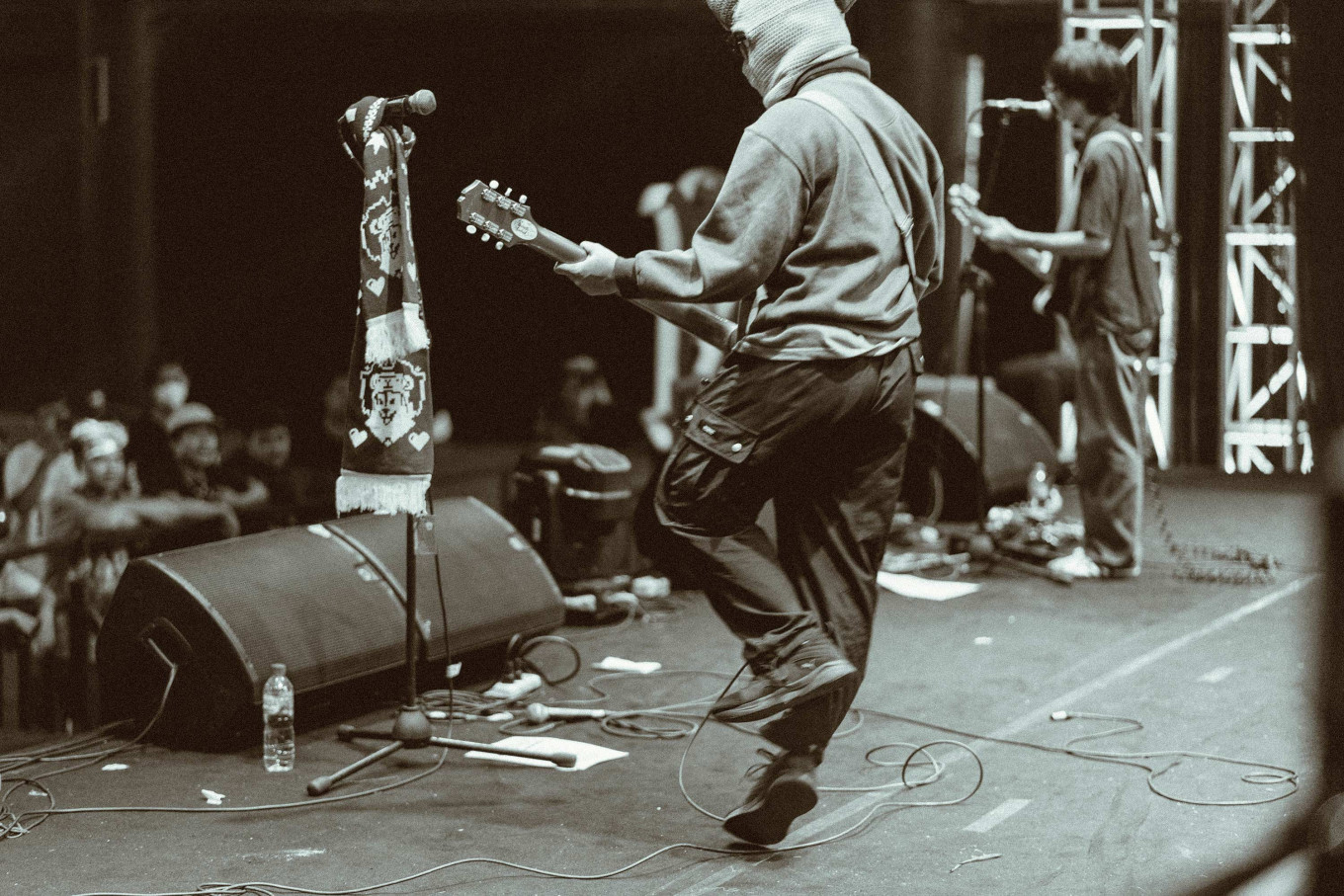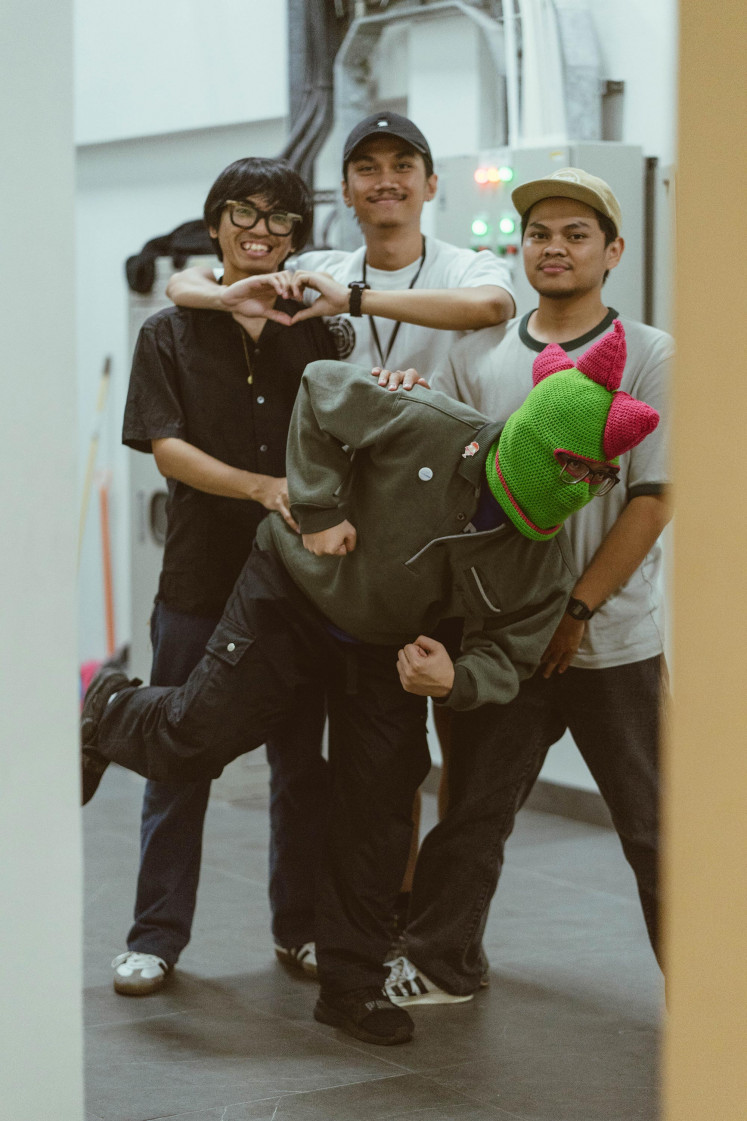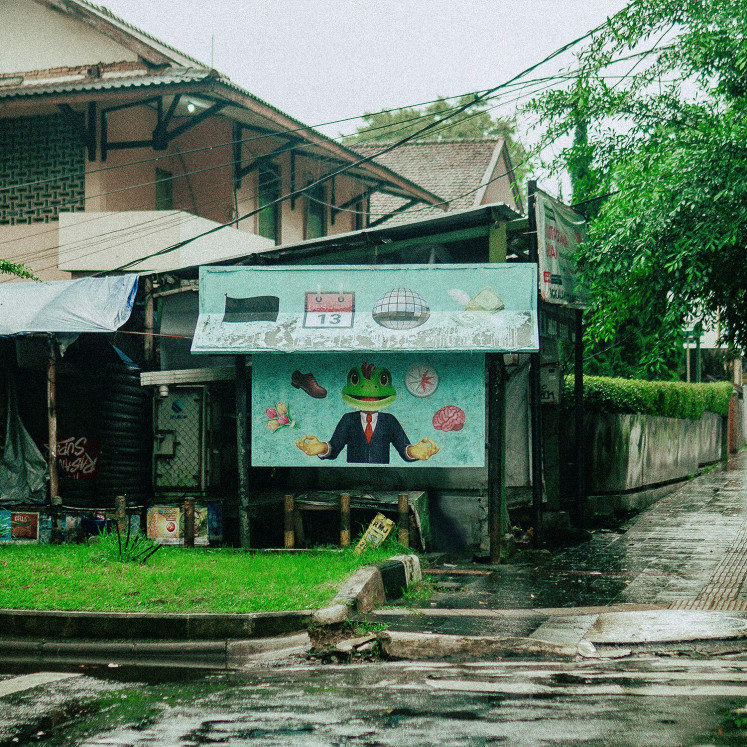Popular Reads
Top Results
Can't find what you're looking for?
View all search resultsPopular Reads
Top Results
Can't find what you're looking for?
View all search resultsHow punk-band Dongker became the next big thing
Bandung, West Java, punk-quartet Dongker finds new spark at the verge of disbanding and plans five consecutive singles chaotically before releasing a new album in August.
Change text size
Gift Premium Articles
to Anyone
B
span style="color:#0E101A">Bandung, West Java, punk quartet Dongker finds a new spark at the verge of disbanding and plans five consecutive singles chaotically before releasing a new album in August.
In November 2022, the potty-mouthed art students (now graduates) that comprise Bandung, West Java, punk-outfit Dongker went for one last push before considering whether they should disband.
Dongker decided to bet everything on an aptly named single: “Bertaruh Pada Api” (Betting on Fire). Although the odds did not seem to be in its favor, everything seemed to snowball as it gained a new spectrum of listeners with the single’s release.
Playing with fire
“We were lucky that we opened [with “Bertaruh Pada Api”] first,” mused Bilal Ahmad, the band’s bassist, speaking to The Jakarta Post on Jan. 12, right after a rehearsal session in Bandung. He threw a suppressed grin at Delpi Suhariyanto, the band’s guitarist/vocalist, sitting beside him. “We were thinking of disbanding,” Suhariyanto gave a dry chuckle.
However, it was not pure luck that the single became a monumental follow-up to their second EP. Dongker had matured and evolved as a band, and “Bertaruh Pada Api” is the culmination of every wound, or experience, that it bore on its journey.
In “Bertaruh Pada Api,” Suhariyanto (who wrote the lyrics) grittily sang almost off-key over rumbling drums and shimmering guitar about hope and despair as he poetically betted on something temporary. He is battle-hardened but still broken, wounded and helpless as he curses himself before the turning wheels of fate, a maelstrom of complex emotions.
Rebels: (clockwise from left) Delpi Suhariyanto, Dzikri Arethusa, Bilal Ahmad and Arno Zarror posing backstage. (courtesy Dongker) (Archive/Courtesy of Dongker)
Arno Zarror, the band’s guitarist/vocalist, jeered that the song was actually about Suhariyanto’s love life. “It was flawless,” Zarror remarked about the song’s lyrics. “It’s about forbidden love,” Zarror continued, gesturing as if he was reading a manuscript, and gave a loud cackle as Suhariyanto cut him off.
Dongker’s past releases gave it an image of a crass intellectual in emotional turmoil who made jokes about everything and was constantly flipping its middle finger at everyone. But it has seemingly toned down its anger and grown more thoughtful as it plans a string of releases leading to its upcoming album in August.
Dwelling on misfortunes
One of the qualities it maintained was its self-deprecating edge while experimenting with everything new, including longer song durations. Suhariyanto pointed out that Zarror had the idea of stitching together the titles of each song in the forthcoming studio album so that it would make a complete sentence.
“For instance, ‘Kesialan’ [Misfortune], then ‘Demi’ [For the Sake of],’ then na-na-na-na,” said Zarror. “But it’s hard!” Suhariyanto countered. “Just the titles, it’d be funny,” Zarror replied. Suhariyanto claimed that Zarror was keen on having “misfortunes” as the forthcoming album’s theme.
Zarror could come across as the most-visible force driving the band’s self-deprecating edge. However, in truth, all four of them equally share the same sensibilities.
As Zarror talked about oversharing his personal life during his trip to a guitar workshop, Dzikri Arethusa, the band’s drummer, stared blankly into space. “I’m having problems with my girlfriend,” said Arethusa when poked by the others. “It’s difficult, being a young man,” Zarror jeered.
“I was letting everything out just now,” Arethusa continued, referring to the band’s rehearsal session.
“That was powerful,” added Ahmad
“The tempo was perfect,” Suhariyanto joined in.
“Keep it up!” Zarror chimed with a sneer.
“I need to be sad all the time?” joked Arethusa.
Emojis ahoy: The cover image for Dongker's second single 'Sepenggal Sadar' by Studio Pancaroba. (courtesy Dongker) (Archive/Courtesy of Dongker)
The album’s main difference, compared to past releases, according to Suhariyanto, was that it wanted the album to be more relatable. “In our past albums, we didn’t care about anything,” said Suhariyanto. In “Kita Tersesat” (We’re Lost), Zarror sang in tongues without a care for the world and slipped in the names of the professors from the art faculty that they studied at in “Terlalu Bodoh Untuk Bandung” (Too Stupid for Bandung).
“We’ve shunned all that away,” said Suhariyanto. “To be more ‘pop’.”
Borrowed thunders
Its follow-up singles are melanges of friends-initiated works (the visuals), family-triggered social critics, borrowed perspectives of a close friend in grief and even chords that it “borrowed” from other artists, which it then uses to build songs on.
For its second single, “Sepenggal Sadar” (A Bit of Consciousness), Suhariyanto noted that it worked with Studio Pancaroba for the visuals. It vandalized a warung just at the corner of Jl. Ganesha, Bandung, with emojis reminiscent of Zarror’s usual stage outfit at the center: a green, Super Mario Bros Yoshi-esque knitted balaclava.
“Sidney worked on the visuals for the first and did the chords for our third single, ‘Tuhan Di Reruntuh Kota’ (God Among the City Ruins),” added Suhariyanto, referring to Bandung-based designer Sidney Islam. He then admitted that, after working on the album, he realized that he is not good at making chords for the band. “So I took others’ chords.”
“For ‘Bertaruh Pada Api’, we took chords from Frank Ocean’s ‘Self Control’, ‘Sepenggal Sadar’ from Tony Molina’s and Alex G., ‘Tuhan di Reruntuh Kota’ from Tyler, The Creator’s ‘Earfquake’,” remembered Suhariyanto, laughing.
While it already released “Sepenggal Sadar”, its third through fifth (and also the album) is still in the works. Suhariyanto pointed out that it is going to work on the singles nearing its respective release dates, in contrast to the standard practice where musicians usually hold off releases before they finalize everything.
“We don’t know what our lives will be like. It’s too chaotic,” said Suhariyanto. “Arno here is currently in a fight with a rock star. Who knows what lies ahead.” The others jeered at Zarror.













